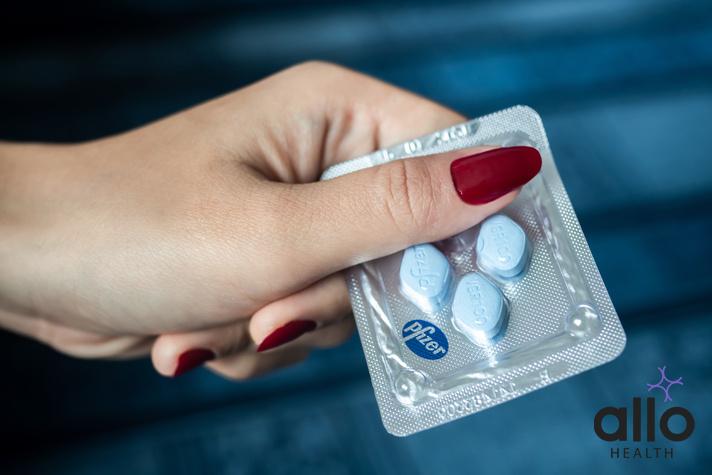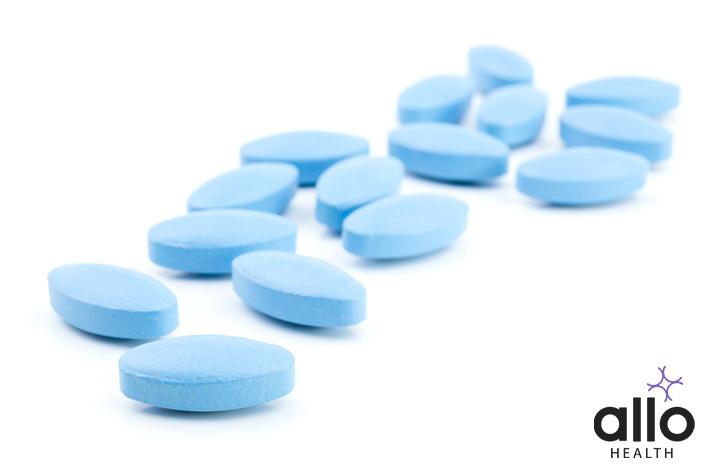What are the Uses of Viagra Tablets?

Allo Health is dedicated to personalized well-being, offering support and trusted information tailored to individual health goals. The platform emphasizes human-generated content, led by a distinguished medical team of experts, including physicians and sexual health specialists. Their commitment to credibility involves rigorous fact-checking, authoritative research, and continuous updates to ensure accurate, up-to-date information. Allo Health's unique approach goes beyond conventional platforms, providing expert-led insights and a continuous commitment to excellence, with user feedback playing a crucial role in shaping the platform's authoritative voice.

Dr. Aditi completed her undergraduate medical education at AJIMS, Mangalore, after which she worked in multi-speciality hospitals with COVID patients and in the Pain and Palliative medicine department. Driven by her experiences, she developed a keen interest in psychiatry. Dr. Aditi believes that mental health is just as, if not more important, than physical health.
Why This Was Upated?
Our experts continually monitor the health and wellness space, and we update our articles when new information became available.
Updated on 18 December, 2023
- Article was updated as part of our commitment to diversity, equity, and inclusion.

"The following blog article provides general information and insights on various topics. However, it is important to note that the information presented is not intended as professional advice in any specific field or area. The content of this blog is for general educational and informational purposes only.
Book consultation
The content should not be interpreted as endorsement, recommendation, or guarantee of any product, service, or information mentioned. Readers are solely responsible for the decisions and actions they take based on the information provided in this blog. It is essential to exercise individual judgment, critical thinking, and personal responsibility when applying or implementing any information or suggestions discussed in the blog."
Viagra tablets, also known as sildenafil citrate, are a medication used to treat erectile dysfunction (ED) and pulmonary arterial hypertension (PAH). But how do these small blue pills work? In this article, we will explore the mechanism of action of Viagra tablets, benefits, side effects, and much more.
Viagra and It’s Active Ingredient
Viagra, also known by its generic name sildenafil, is a medication primarily used to treat erectile dysfunction (ED) in men for improved erections. It belongs to a class of drugs called phosphodiesterase type 5 (PDE5) inhibitors. Viagra works by increasing blood flow to the penis during sexual stimulation, which helps men achieve and maintain an erection.
The active ingredient in Viagra is sildenafil citrate. Each Viagra tablet typically contains 25, 50, or 100 milligrams of sildenafil citrate.
Viagra Tablet Uses
For Erectile Dysfunction:
Erectile Dysfunction (ED) is a medical condition characterised by the consistent inability to achieve and maintain an erection that is firm enough for sexual intercourse. It can be caused by a variety of factors, including physical, psychological, or a combination of both. One common physiological cause is the insufficient blood flow to the penis, hindering the ability to achieve an erection.
Viagra, with its active ingredient sildenafil, is a phosphodiesterase type 5 (PDE5) inhibitor. This medication addresses the physiological aspect of ED by targeting the PDE5 enzyme, which plays a role in regulating blood flow.
So, how does it work?
- Initiation of Sexual Stimulation: For Viagra to be effective, sexual arousal or stimulation is necessary. It does not cause spontaneous erections; instead, it enhances the natural process in response to sexual stimuli.
- Relaxation of Blood Vessels: When a man is sexually aroused, nitric oxide is released in the erectile tissue of the penis. Nitric oxide then activates an enzyme called guanylate cyclase, leading to increased levels of cyclic guanosine monophosphate (cGMP).
- Inhibition of PDE5: Viagra works by inhibiting the action of PDE5, an enzyme that breaks down cGMP. By inhibiting PDE5, Viagra allows cGMP to accumulate, promoting the relaxation of smooth muscle cells in the blood vessels of the penis.
- Increased Blood Flow: The relaxation of smooth muscle cells and the increased levels of cGMP lead to vasodilation, or the widening of blood vessels. This, in turn, enhances blood flow to the erectile tissue of the penis.
- Erection Formation: With increased blood flow to the penis, an erection can be achieved and maintained, as the erectile tissue becomes engorged with blood. This allows for a sustained erection that is sufficient for sexual activity.
While Viagra is effective for many individuals with ED, it may not be suitable for everyone.

For Pulmonary Arterial Hypertension:
Pulmonary Arterial Hypertension (PAH) is a serious medical condition characterised by elevated blood pressure in the arteries that supply the lungs. This increased pressure puts strain on the heart as it works harder to pump blood through the lungs, leading to various symptoms and complications. PAH can result from various underlying causes, including idiopathic (unknown origin), hereditary factors, connective tissue diseases, or exposure to certain drugs and toxins.
How does it work?
- Vasodilation in the Lungs: Similar to its mechanism of action in treating ED, Viagra acts as a phosphodiesterase type 5 (PDE5) inhibitor in the context of PAH. In the lungs, this inhibition leads to the accumulation of cyclic guanosine monophosphate (cGMP), a signaling molecule that promotes vasodilation.
- Relaxation of Pulmonary Blood Vessels: By inhibiting PDE5, Viagra enhances the effects of nitric oxide, a substance released in response to various stimuli, including the presence of cGMP. Nitric oxide causes the relaxation of smooth muscle cells in the walls of the pulmonary arteries, leading to vasodilation.
- Reduced Strain on the Heart: As the pulmonary blood vessels dilate, the resistance to blood flow in the lungs decreases. This reduction in resistance means that the heart doesn’t have to work as hard to pump blood through the pulmonary arteries. Consequently, the workload on the right side of the heart, which pumps blood to the lungs, is reduced.
- Improved Exercise Capacity: By easing the strain on the heart and improving blood flow in the pulmonary arteries, Viagra can enhance exercise capacity and alleviate symptoms associated with PAH, such as shortness of breath and fatigue.
It’s essential to highlight that the use of Viagra for PAH should be done under the supervision and guidance of a healthcare professional. The dosage and administration will be tailored to the individual’s specific condition and medical history.
Different Dosages and Their Uses
Viagra (sildenafil) is available in different dosages, and the appropriate dosage is typically determined by a healthcare professional based on an individual’s specific needs, health status, and response to the medication.
25 mg: This lower dosage is often prescribed for individuals who are more sensitive to medications or for those who may experience side effects at higher doses. It can be a starting point for some individuals or used as a maintenance dose.
50 mg: The 50 mg dosage is a standard starting dose for many individuals with erectile dysfunction. It provides a balanced approach, offering effectiveness for a significant number of users while minimising the risk of side effects.
100 mg: This is the maximum recommended dosage for Viagra. It may be prescribed for individuals who do not achieve the desired effect with lower doses. However, it’s important to note that a higher dosage may increase the risk of side effects.
It’s crucial to follow the prescribed dosage and not self-adjust the amount without consulting a healthcare professional.
Viagra Side Effects
Viagra (sildenafil) is generally well-tolerated, but like any medication, it can cause side effects in some individuals. It’s important to note that not everyone will experience these side effects, and for many people, any side effects are mild and temporary. Here is a list of potential side effects associated with Viagra:
Common Side Effects (Mild Side Effects):
- Headache: This is one of the most common side effects reported by individuals taking Viagra.
- Flushing (Warmth and Redness in the Face or Neck): Some people may experience a feeling of warmth or redness in the upper body, particularly the face.
- Indigestion or Stomach Upset: Digestive issues such as indigestion, stomach discomfort, or nausea can occur.
- Dizziness or Lightheadedness: Some individuals may feel dizzy or lightheaded, especially when standing up quickly.
- Nasal Congestion: Stuffy nose or runny nose is a reported side effect in some cases.
- Changes in Vision: Some people may experience temporary vision changes, such as blurred vision or a blue-green tint.
Less Common Side Effects:
- Back Pain: Some individuals may experience back pain as a side effect.
- Muscle Pain: Pain in the muscles, known as myalgia, can occur.
- Priapism: Priapism is a rare but serious side effect involving a prolonged and sometimes painful erection. If an erection lasts longer than four hours, it is to be considered as a medical emergency and a visit to the nearest emergency is recommended.
Serious Side Effects (Rare): While serious side effects are rare, they can include:
- Sudden Vision Loss or Hearing Loss: Seek immediate medical attention if you experience sudden loss of vision or hearing loss.
- Serious Allergic Reactions: In rare cases, individuals may experience serious allergic reactions, including rash, itching/swelling, severe dizziness, or difficulty breathing.
Read more about the side effects of Viagra here.

It’s essential for individuals to seek medical attention if they experience severe or persistent side effects. Additionally, individuals with certain pre-existing health conditions or those taking specific medications should inform their healthcare provider before using Viagra to ensure its safety and effectiveness for their specific situation. They may help by changing the dosage or prescribing an alternate medicine.
Dosage Instructions
Dosage instructions for Viagra (sildenafil) should always be followed as prescribed by a healthcare professional. The appropriate dosage depends on various factors, including an individual’s health status, response to the medication, and any underlying health conditions.
Typical Dosages:
- Starting Dosage: The typical starting dosage is 50 mg, taken approximately one hour before sexual activity. However, healthcare providers may adjust this based on individual needs and tolerance.
- Adjustments: Depending on the response and any potential side effects, the dosage may be adjusted to 25 mg or increased to 100 mg.
Administration:
- Timing: Viagra is usually taken about 30 minutes to an hour before sexual activity. It’s important to note that the medication may take longer to work if taken with a high-fat meal.
- Frequency: It should not be taken more than once per day. The effects of Viagra typically last for about four to six hours.
Individualised Approach:
- Health Assessment: Before prescribing Viagra, healthcare professionals consider an individual’s overall health, existing medical conditions, and other medications being taken.
- Dosage Adjustment: Dosage adjustments may be necessary for individuals with certain health conditions or those taking medications that may interact with Viagra.
Precautions:
- Alcohol and Grapefruit Juice: It’s advisable to limit alcohol consumption while using Viagra, as excessive alcohol can impair the ability to achieve an erection. Grapefruit juice may also interact with Viagra and should be avoided.
- Medical Consultation: Individuals with certain health conditions, such as cardiovascular issues or a history of priapism, should consult their health care professional before using Viagra.
Emergency Situations:
- Priapism: If an erection lasts longer than four hours, seek immediate medical attention. Priapism can be a serious and potentially painful condition.
- Sudden Vision or Hearing Loss: Seek immediate medical attention if sudden vision or hearing loss occurs.
Safety Instructions
Using Viagra (sildenafil) safely involves following specific instructions to minimize the risk of potential side effects and ensure its effectiveness.
- Consult with a Healthcare Professional: Always consult with a healthcare provider before starting Viagra. This is crucial, especially if you have pre-existing health conditions, are taking other medications, or have a history of certain medical issues.
- Provide a Complete Medical History: Inform your healthcare provider about your complete medical history, including any heart problems, kidney or liver disease, high or low blood pressure, history of stroke, eye problems, and any allergies.
- Medication Interactions: Inform your healthcare provider about all the medications you are currently taking, including prescription and over-the-counter drugs, herbal supplements, and vitamins. Some medications may interact with Viagra, potentially affecting its efficacy or increasing the risk of side effects.
- Prescribed Dosage: Follow the prescribed dosage and instructions provided by your healthcare professional. Do not self-adjust the dosage without consulting your doctor.
- Take Viagra as Needed: Viagra is usually taken as needed, about 30 minutes to one hour before sexual activity. Avoid taking it more than once a day.
- Avoid Grapefruit Products: Grapefruit and grapefruit juice can interact with Viagra and increase the risk of side effects. It’s advisable to avoid consuming grapefruit products while using Viagra.
- Avoid Alcohol and Large Meals: Excessive alcohol consumption can decrease blood flow to the penis, counteracting the effects of Viagra. Additionally, large or high-fat meals may delay the onset of Viagra’s action.
- Monitor for Side Effects: Be aware of potential side effects such as headache, flushing, dizziness, or changes in vision. If you experience severe or persistent side effects, seek medical attention.
- Priapism: Priapism, a prolonged and sometimes painful erection lasting more than four hours, requires immediate medical attention. If this occurs, seek emergency medical help.
- Vision or Hearing Changes: If you experience sudden vision or hearing loss, stop taking Viagra and seek immediate medical attention.
- Allergic Reactions: Be alert to signs of serious allergic reactions, including rash, itching, swelling, severe dizziness, or difficulty breathing. Seek emergency medical help if these occur.
- Store Properly: Store Viagra at room temperature away from moisture and heat. Do not store it in the bathroom.

Drug Interactions
Viagra (sildenafil) can interact with certain drugs, potentially affecting its efficacy or increasing the risk of side effects. It’s crucial to inform your healthcare provider about all medications, supplements, and herbal products you are taking before starting this brand-name medication. Here are some notable drug interactions:
- Nitrate Medicine: The combination of Viagra with nitrates or nitric oxide donors (commonly prescribed for chest pain or heart conditions) can lead to a dangerous drop in blood pressure. It is absolutely contraindicated to use Viagra with nitrates.
- Alpha-Blocker Drugs: Alpha-blockers, medications used to treat high blood pressure and prostate conditions, can enhance the hypotensive effects of Viagra, leading to a significant drop in blood pressure. Dosage adjustments may be necessary.
- Antihypertensive Medications: Other antihypertensive medications may interact with Viagra, potentially causing a further decrease in blood pressure. Close monitoring and dosage adjustments may be needed.
- Protease Inhibitors: Protease inhibitors, used in the treatment of HIV, can increase the levels of Viagra in the blood, potentially leading to an increased risk of side effects. Dosage adjustments may be necessary.
- Certain Antibiotics: Some antibiotics, such as erythromycin and clarithromycin, can increase the levels of Viagra in the blood, potentially leading to an increased risk of side effects. Dosage adjustments may be necessary.
- Antifungal Medications: Certain antifungal medications and antimicrobial drugs, such as ketoconazole and itraconazole, can increase the levels of Viagra in the blood. Dosage adjustments may be necessary.
- Guanosine Monophosphate Analogues: Guanosine monophosphate analogues, such as riociguat, are used to treat pulmonary arterial hypertension. Combining Viagra with these drugs can lead to a significant drop in blood pressure.
- Rifampin: Rifampin, an antibiotic used to treat tuberculosis and certain bacterial infections, can reduce the effectiveness of Viagra.
This list is not exhaustive, and there may be other medications that can interact with Viagra.
Key Takeaways
- Viagra, or sildenafil citrate, is a prescription medicine used in the treatment of erectile dysfunction (ED) in males and pulmonary arterial hypertension (PAH).
- Viagra’s active ingredient is sildenafil citrate, typically in 25, 50, or 100 mg tablets.
- For ED, Viagra, a phosphodiesterase type 5 (PDE5) inhibitor, enhances blood flow to the penis during sexual stimulation.
- In PAH, Viagra relaxes pulmonary blood vessels, reducing strain on the heart and improving exercise capacity.
- Different dosages (25 mg, 50 mg, 100 mg) cater to individual needs, balancing efficacy and side effects.
- Safety measures include medical consultations, avoiding interactions, adhering to prescribed dosages, and recognizing potential adverse effects or emergencies.
Frequently Asked Questions
Q: Can Viagra cause heart attack?
A: In rare cases, Viagra may cause a temporary decrease in blood pressure, so individuals with pre-existing heart conditions should consult their doctor. It’s crucial to follow prescribed dosages for safety.
Q: Can patients with history of heart failure take Viagra?
A: Patients with a history of heart failure should consult their healthcare provider before using Viagra. The medication’s effects on blood flow may require careful consideration, and dosage adjustments may be necessary.
Q: Can patients with heart disease take Viagra?
A: Individuals with heart disease should consult their healthcare provider before using Viagra. While it’s generally safe, precautions are essential due to its effects on blood pressure.
Q: Can patients with kidney disease take Viagra?
A: Individuals with kidney disease should consult their healthcare provider for personalized advice. Dosage adjustments may be necessary, and careful monitoring is recommended.
Q: Can Viagra help with other sexual dysfunctions?
A: Viagra is specifically designed for erectile dysfunction. While it focuses on improving blood flow to the penis, it may not address other sexual dysfunctions. Different medications or interventions might be recommended based on the specific issue.
Q: What are the other medications for Erectile Dysfunction?
A: Other medications for ED include Cialis (tadalafil), Levitra (vardenafil), and Stendra (avanafil). Each has unique characteristics, and the choice depends on individual preferences and health considerations.
Q: Does Viagra increase sex drive?
A: Viagra does not directly increase sex drive. It enhances the physiological response to sexual stimulation by increasing blood flow to the penis, aiding in achieving and maintaining an erection.
Q: Can excessive amounts of alcohol interact with Viagra?
A: Excessive alcohol consumption can lead to dangerous effects such impair the ability to achieve an erection and may increase the risk of side effects like abnormal vision, upset stomach etc. It’s advisable to limit alcohol intake while using Viagra to ensure its effectiveness and minimize potential complications.






































